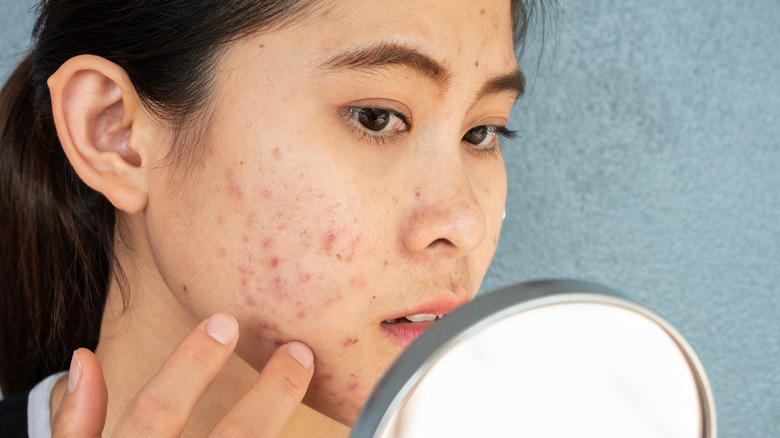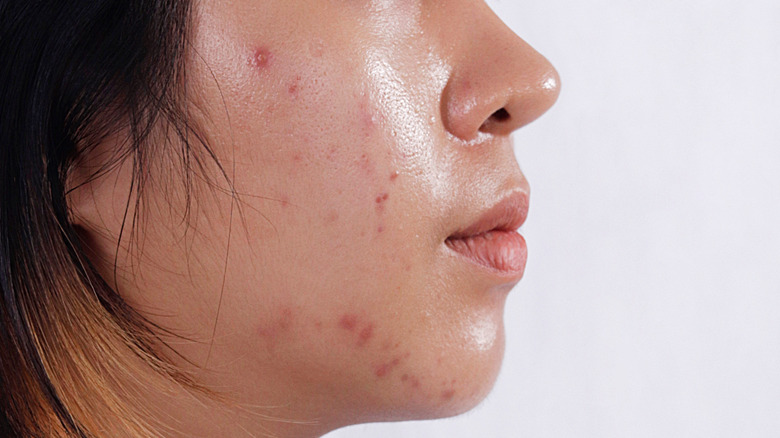How To Incorporate Topical Spironolactone Into Your Skincare Routine
Acne, in whatever shape or form it manifests, can be tough to treat. If you're lucky, you can hack it with a pimple patch or a spot treatment, but if your acne is more severe, more robust solutions might be necessary.
Hormonal acne is even harder to treat, considering that it's brought about by your hormones going haywire. Experts note that when hormones like estrogen, progesterone, and testosterone fluctuate, your skin produces more sebum than usual, which then leads to breakouts and inflammation. If you have hormonal acne, you may notice that you break out in the same areas and around the same time of the month. "Hormonal acne often manifests in a cyclical pattern, much like women's menstrual cycles," Dr. S. Manjula Jegasothy, a board-certified dermatologist, explained to Self. "This is true even in postmenopausal women, because these women still experience monthly fluctuations in their estrogen and progesterone levels, albeit lower than pre-menopausal women."
Since hormonal acne can be stubborn, run-of-the-mill over-the-counter treatments don't often work. To get rid of it completely, you would need medication that helps manage your hormones. The acne medication spironolactone happens to be one great option.
What is spironolactone?
If you've already encountered spironolactone in the past, it's likely that you've heard it in a different context. After all, it's a medication that has long been prescribed as a diuretic for people struggling with high blood pressure and other heart-related concerns. But in recent years, doctors have been prescribing it to people with hormonal acne as a form of treatment because of how well it targets the same hormones that cause blemishes.
"Spironolactone lowers blood pressure by acting on specific hormones in the body. These hormones just so happen to play a role in hormonal acne," dermatologist Dr. Claudia Ricotti shared with Cleveland Clinic. "Dermatologists have used spironolactone for many years as a well-studied and effective treatment option for hormonal acne." Meanwhile, dermatologist Dr. Shari Marchbein likens spironolactone to Pac-Man. "It eats hormones at the level of the oil gland, so it doesn't allow hormones produced by the body, such as testosterone, to bite the oil glands," she told Marie Claire. The less testosterone you have, the less oil your skin produces, which then results in clearer skin.
For the longest time, spironolactone came in the form of pills. But while taking it orally can produce impressive results, it still has notable side effects, including bloating, dizziness, a boost in potassium, and fatigue. Luckily, you can still gain the benefits of the medication by opting for its topical counterpart.
Use topical spironolactone with caution
It should be noted that spironolactone is still not FDA-approved for acne treatment, so it's often prescribed and used off-label. Still, if you want to reap the benefits, it's worth discussing with your dermatologist. If you're not too keen on taking the pill version, the topical option may work, although it only targets the acne already on the surface of your skin.
"Topical spironolactone is the topical formulation that is mainly used for acne that has a hormonal contribution," dermatologist Dr. Anthony Rossi shared with PopSugar. "It has shown good results for hormonal-induced acne and doesn't have the same effect profile as oral spironolactone in terms of blood pressure or potassium levels." And while it may be the more convenient option, it reportedly causes dryness or irritation. It's recommended that you veer away from products that deliver the same effect, or if not, use them alternately with topical Spironolactone.
You can't also expect topical spironolactone to be as effective as its oral counterpart since the latter fights hormonal acne from the inside. If you wish to take full advantage of the medication, you can always use both forms. Talk with your dermatologist about using them together and adjusting dosages based on what your skin can tolerate.


